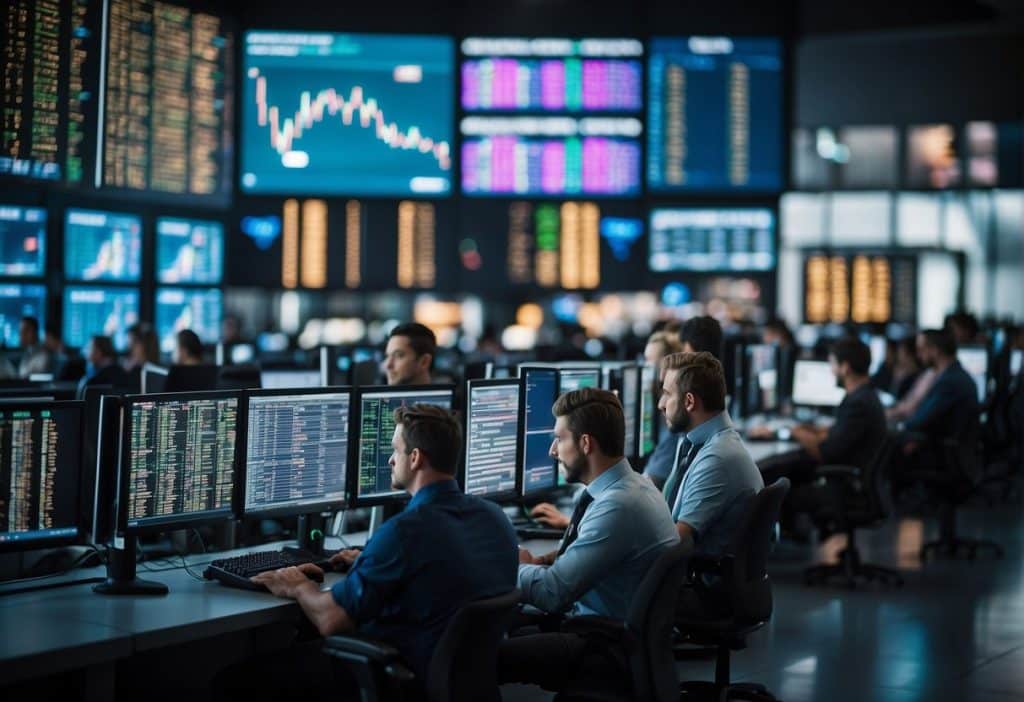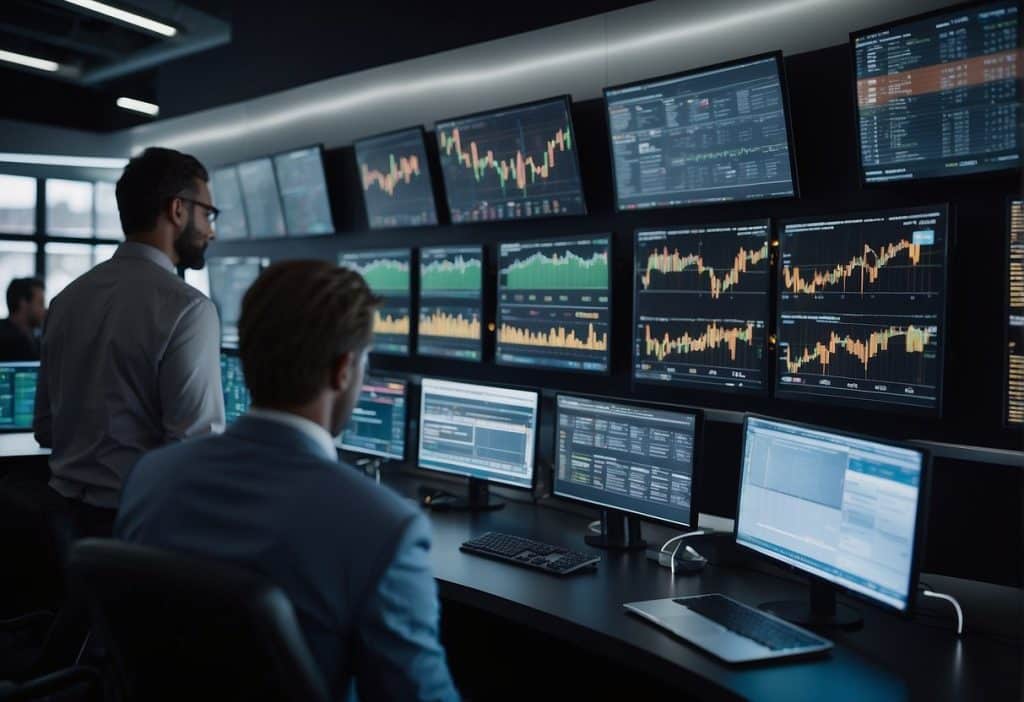In 2024, cryptocurrency exchanges have evolved to offer more diverse and sophisticated platforms, catering to a range of investors from beginners to seasoned traders. As the market matures, the importance of choosing the right exchange has never been more critical. Features such as user experience, security measures, transaction fees, and regulatory compliance are determining factors that should guide your selection process when researching the best crypto exchanges available.
Each crypto exchange boasts unique characteristics that might suit different trading styles and goals. Whether you’re interested in a wide array of financial instruments, specialized trading services, or a particular type of asset diversity, there is an exchange tailored to your needs. It is paramount to understand the various kinds of exchanges available—from traditional centralized models to decentralized finance (DeFi) platforms—and how they align with your investment strategies.
Key Takeaways
- Selecting a suitable crypto exchange is crucial and depends on features like security, user experience, and fees.
- Different types of exchanges cater to varied trading styles and levels of investment experience.
- Evaluating exchanges involves an analysis of financial instruments offered, regulatory standards, and customer services.
Key Features of Top Crypto Exchanges

Selecting a top-tier crypto exchange in 2024 involves evaluating a suite of key features that ensure your trading experience is secure, cost-effective, and tailored to your needs whether you’re a beginner or a seasoned trader.
Security Measures
Top crypto exchanges prioritize your funds’ safety with robust security measures. You’ll find features like two-factor authentication (2FA), cold storage of assets, and insurance policies against cyber theft. For instance, Gemini is renowned for its high-security standards, making it a go-to for safeguarding investments.
Currency Support and Trading Pairs
Diverse currency support and a wide range of trading pairs are vital for flexible trading. Exchanges like Kraken and Coinbase offer a substantial variety of cryptocurrencies and trading pairs, ensuring you can trade popular and niche currencies alike.
| Exchange | Number of Cryptocurrencies | Trading Pairs |
|---|---|---|
| Kraken | 100+ | Multiple |
| Coinbase | 50+ | Multiple |
Fee Structures
Understanding the fee structure is crucial for cost-effective trading. Fee models vary, with some exchanges charging a maker/taker fee, while others have tiered structures based on your trading volume. eToro, for example, imposes fees ranging from 0.95% to 1.25%.
User Experience and Customer Support
Your trading experience should be smooth and supported. Exchanges like Coinbase are tailored for beginners, while Kraken caters to experienced traders. Robust customer support is essential, with many platforms offering 24/7 assistance.
Mobile Apps and Trading Platforms
A top-notch mobile app and trading platform ensure you can trade on the go and enjoy a seamless interface. Crypto.com is often cited for its impressive mobile app catering to a range of trading functionalities.
Advanced Trading Options and Features
For the advanced trader, exchanges offer features like futures trading. MEXC, for example, is a prime example for its extensive range of futures trading pairs. Look for platforms that provide advanced order types and leverage options for sophisticated trading strategies.
Understanding Different Types of Best Crypto Exchanges
When considering the landscape of cryptocurrency exchanges in 2024, you’ll encounter two primary categories: Centralized Exchanges (CEXs) and Decentralized Exchanges (DEXs). Each type has distinct operational models and implications for your trading experience.
Centralized Exchanges
Centralized Exchanges are akin to traditional financial institutions for digital assets. When you use a CEX, the company that operates the exchange processes and holds your transactions. Privacy may sometimes take a back seat since these platforms typically require personal identification for account creation, following Know Your Customer (KYC) and Anti-Money Laundering (AML) regulations.
Advantages of CEXs:
- Higher Liquidity: Due to a larger user base.
- User-friendly Interfaces: Often preferred by beginners.
Disadvantages of CEXs:
- Custodial Risks: Controlled by a single entity, which may be vulnerable to security breaches.
- Regulation: Subject to government oversight, which could impact operations.
Decentralized Exchanges
A Decentralized Exchange, or DEX, allows you to trade directly from your wallet without an intermediary. DEXs operate on the principles of DeFi or decentralized finance and typically provide less regulation, offering a more private trading experience.
Advantages of DEXs:
- Non-custodial: You maintain control of your private keys.
- Privacy: Less stringent requirements for personal information.
Disadvantages of DEXs:
- Lower Liquidity: Fewer users may mean less market depth.
- User Experience: Can be more complex, deterring inexperienced users.
Comparative Analysis of Major Exchanges
In evaluating some of the most prominent cryptocurrency exchanges in 2024, it’s important to consider factors such as trading volume, fees, security, and the range of services offered. Each exchange has distinct characteristics worth noting.
Coinbase Overview
As a leading platform, Coinbase is often heralded for its user-friendly interface, making it ideal for you if you’re a beginner. As of 2024, Coinbase maintains a solid reputation for security and has a substantial trading volume, reflecting its high liquidity. Moreover, Coinbase provides educational resources enhancing your understanding of cryptocurrency trading.
Binance Insights
Binance boasts one of the highest trading volumes among all exchanges, indicative of its global popularity and liquid markets. For you, this may translate to better price discovery and trade execution. Importantly, its fee structure remains competitive, often cited as one of the lowest, which can be crucial for minimizing your trading costs.
Kraken Evaluation
Regarded for its robust security measures, Kraken has continued to be a trusted exchange for both beginners and experienced traders. Your safety is reinforced by comprehensive security protocols. Additionally, Kraken’s fee structure is transparent, and it’s known for a diverse range of available cryptocurrencies to trade.
Gemini Breakdown
Gemini has built a platform that prioritizes security and regulatory compliance, which may bring peace of mind to your trading experience. It typically appeals to you if you’re seeking a regulated environment, though it might offer a more limited selection of cryptocurrencies compared to others.
KuCoin Analysis
KuCoin is recognized for listing a wide array of altcoins, which might be appealing to you if diversification is part of your trading strategy. Its trading volume is not as high as Binance or Coinbase but has been steadily growing, suggesting an increasing user base and liquidity.
| Feature | Coinbase | Binance | Kraken | Gemini | KuCoin |
|---|---|---|---|---|---|
| User-Friendliness | High | Moderate | High | Moderate | Moderate |
| Trading Volume | High | Very High | High | Moderate | Moderate |
| Fees | Competitive | Low | Competitive | Competitive | Low |
| Security | Strong | Strong | Very Strong | Very Strong | Strong |
| Altcoin Variety | Moderate | High | High | Low | Very High |
As you use these platforms, you’ll want to weigh their features against your specific needs such as costs, ease of use, and the importance you place on security and regulatory compliance.
Specialized Trading Services
In 2024, specialized trading services have become integral to maximizing investment strategies within the crypto landscape. By engaging in futures and derivatives trading, staking and earning options, and leveraged trading and margin accounts, you can enhance your cryptocurrency portfolio’s potential.
Futures and Derivatives Trading
Futures and derivative trading enables you to speculate on the future price of cryptocurrencies without the need to own the underlying asset. Exchanges like Binance and Kraken offer extensive futures trading options, with the former being highly regarded for its overall experience in this realm. A futures contract allows you to buy or sell a particular cryptocurrency at a predetermined price at a specific time in the future.
- Binance: Comprehensive futures trading with various tools and indicators.
- Kraken: Known for strong security measures in futures trading.
Staking and Earning Options
Staking is the process of actively participating in transaction validation on a proof-of-stake (PoS) blockchain. By staking your coins, you can earn rewards. Exchanges such as Coinbase and Crypto.com provide staking services for a range of PoS cryptocurrencies.
- Coinbase: Offers staking rewards with user-friendly experience.
- Crypto.com: Provides competitive earning rates on staked cryptocurrencies.
Leveraged Trading and Margin Accounts
Leveraged trading allows you to trade more than the amount of capital you deposit, whereas margin accounts enable the borrowing of funds to trade. This can amplify both gains and losses. Kraken is known for the number of cryptocurrencies you can trade on margin, while eToro provides an accessible platform for those looking to utilize leverage in their trades.
- Kraken: Diverse selection of cryptocurrencies for margin trading.
- eToro: User-friendly platform for leveraged trading, especially for newcomers.
Financial and Investment Instruments

Cryptocurrency exchanges have evolved to offer a range of financial instruments. You now have access to tools that cater to various investment strategies, including cryptocurrency investment funds, exchange-traded funds (ETFs), and traditional assets integrated within crypto platforms.
Cryptocurrency Investment Funds
Cryptocurrency investment funds pool investors’ money to purchase a diversified portfolio of digital assets. These funds offer you exposure to cryptocurrencies without the need for direct purchasing or ownership. Consider these funds if you’re looking for diversification and professional management of your crypto investments.
Exchange-Traded Funds (ETFs)
ETFs track the performance of an index, sector, commodity, or other assets and can be purchased on a stock exchange. A crypto-focused ETF enables you to invest in a basket of cryptocurrencies or related companies, providing diversification similar to traditional ETFs but within the cryptocurrency market.
Stocks and Traditional Assets on Crypto Platforms
Some crypto exchanges have begun integrating traditional financial assets, including stocks, into their platforms. This integration allows you to invest in these assets using cryptocurrencies or to have traditional investment vehicles alongside your digital tokens and coins for a more comprehensive investment strategy.
Security and Regulatory Compliance
When investing in cryptocurrencies through exchanges, your key concerns should revolve around the robustness of security measures in place and the level of regulatory compliance, which ensures safeguarding of assets and adherence to legal frameworks.
Insurance and Safeguarding Assets
Your assets on crypto exchanges should be protected by comprehensive insurance policies, designed to cover losses from theft or hacking incidents. Look for exchanges that offer Federal Deposit Insurance Corporation (FDIC) coverage on cash deposits and have clear policies on asset segregation to secure your cryptocurrencies from company insolvency.
Security Breaches and Risk Management
The history of security breaches is a vital indication of an exchange’s capacity for risk management. Exchanges should detail their security measures, including two-factor authentication (2FA), encryption methods, and cold storage practices for asset protection. Additionally, operational security protocols such as regular security audits and real-time monitoring can minimize risks.
Know Your Customer (KYC) and Anti-Money Laundering (AML)
Exchanges under the oversight of the Securities and Exchange Commission (SEC) are mandated to implement KYC and AML programs. This includes stringent identity verification processes and continuous transaction monitoring to deter illicit activities. Ensure your chosen exchange complies with these regulations to maintain a secure trading environment.
Catering to Different Types of Investors
Cryptocurrency exchanges have diversified to meet the varied needs of the investment community, tailoring their services to cater specifically to different levels of trader expertise.
Services for Beginners
If you’re new to the world of cryptocurrencies, selecting an exchange that simplifies the trading process is crucial. User-friendly interfaces and educational resources are key features that help beginners navigate their initial investments. For instance, some platforms offer guided tours of their trading system or demo accounts to practice without financial risk.
- Bitcoin IRA: A platform that allows you to diversify your retirement portfolio with cryptocurrencies.
- Coinbase: Renowned for its intuitive interface, offering a straightforward buying and selling experience ideal for newcomers.
Platforms for Experienced Traders
Experienced traders require platforms with advanced features such as detailed charting tools, API support, and a variety of trading options, including futures, margin trading, and staking. Furthermore, access to a broad range of altcoins and deep liquidity pools is essential for high-volume trading.
- Binance: Offers high liquidity, a vast selection of trading pairs, and advanced trading features suitable for seasoned traders.
- Kraken: Known for robust security measures and a wide array of supported cryptocurrencies, making it a trusted choice for experienced investors.
Payment Methods and Withdrawal Options
Selecting a crypto exchange with versatile payment and withdrawal options can significantly enhance your trading experience by offering convenience and flexibility when dealing with fiat and cryptocurrencies.
Fiat Currency Transactions
For buying and selling cryptocurrencies using fiat currencies, exchanges generally provide multiple methods to deposit and withdraw cash. You typically have the option to link your bank account for direct bank transfers, which can vary in processing time and fees based on the exchange and your bank’s policies.
Fees & Processing Times:
| Method | Fees | Processing Time |
|---|---|---|
| Bank Transfer | 0%-1% | 1-5 business days |
| Wire Transfer | $0-$30 | 1-3 business days |
Cryptocurrency Deposits and Withdrawals
Crypto deposits and withdrawals carry different fees and processing times that depend on the specific cryptocurrency. Withdrawing cryptos to external wallets may include a network fee which is not determined by the exchange itself, but rather the current network congestion of the respective blockchain.
Examples:
- Crypto.com notes variable fees based on the specific cryptocurrency when dealing with withdrawals.
- Some exchanges offer free crypto deposits, while withdrawals may incur a fee.
Credit and Debit Cards
Exchanges often accept credit and debit cards for instant fiat currency deposits, allowing you to buy cryptos swiftly. These transactions may attract higher fees compared to bank transfers due to processing costs levied by the card issuers.
Fees Overview:
- Typical credit or debit card deposit fees range from 1% to 3.99%.
- Certain exchanges may impose minimum and maximum limits on transactions made through cards.
Cost Considerations
When selecting a crypto exchange in 2024, understanding and comparing the cost structures is crucial for your investment strategy. The most common fees you’ll encounter are:
- Trading Fees: Charges incurred when buying or selling on the platform.
- Withdrawal Fees: Costs associated with taking your digital assets off the exchange.
Exchanges may offer a tiered fee structure based on your trading volume; therefore, frequent traders can benefit from reduced trading fees. Here’s a simplified overview of fee structures:
| Exchange | Typical Trading Fee | Benefits for High Volume |
|---|---|---|
| Exchange A | 0.1% | Lower fees for high-volume traders |
| Exchange B | 0.2% | Graduated discounts on a sliding scale |
| Exchange C | 0.15% | Occasional zero-fee promotions |
It’s imperative to consider not just the low fees but also the competitive fees relative to services offered. Some platforms might charge higher fees but provide additional tools and customer support justifying their cost.
Remember, some exchanges may also impose fees on deposits and offer different rates for market takers and makers. Always read the fine print to understand how these could affect your transactions. Your choice should balance seeking low trading fees with optimal exchange functionality to enhance your trading experience.
Assessment of Asset Diversity

Asset diversity is a crucial factor for you to consider when choosing a cryptocurrency exchange. Diversification of assets enables you to spread risk and explore various market opportunities.
Supported Cryptocurrencies: A wide range of supported cryptocurrencies is indicative of an exchange’s capacity to cater to different investor needs. Exchanges like eToro and Coinbase are known for supporting a diverse array of digital assets, not limited to the mainstream options such as Bitcoin (BTC) and Ethereum (ETH), but also including various altcoins and tokens.
Altcoins and Tokens: Altcoins and specialized tokens expand your investment portfolio beyond the dominant currencies. These may include utility tokens, security tokens, or even non-fungible tokens (NFTs).
Number of Cryptocurrencies: As of 2024, some exchanges boast an expansive list, with some offering access to 250+ cryptocurrencies. This allows you to engage with both established and emerging digital assets.
Below is a comparative table that reflects the diversity of cryptocurrencies offered by different exchanges as of February 2024:
| Exchange | Number of Cryptocurrencies | Notable Altcoins and Tokens |
|---|---|---|
| eToro | 250+ | ADA, SOL, DOT |
| Coinbase | 100+ | LINK, ALGO, XTZ |
| Kraken | 80+ | XMR, DASH, ATOM |
Remember, while a higher number of available cryptocurrencies does provide more options, it’s also important for you to research the utility and performance potential of each digital asset. It’s essential that each exchange maintains rigorous standards for the cryptocurrencies they support, ensuring a quality selection for your investment strategies.
Customer-Centric Services

In the evolving landscape of crypto exchanges, your experience hinges greatly on customer-centric services. Customer support and customer service play pivotal roles in ensuring you can navigate the complexities of cryptocurrency trading with ease.
Leading platforms now offer a variety of support options including live chat, email, and phone assistance, often supplemented by extensive FAQs and knowledge bases. These resources aim to empower you as a crypto investor, providing you with the confidence to make informed decisions.
The table below showcases how some renowned exchanges compare in terms of customer support:
| Exchange | Live Chat | Email Support | Phone Support | Knowledge Base |
|---|---|---|---|---|
| Binance | Yes | Yes | No | Extensive |
| Coinbase | Yes | Yes | Yes | Extensive |
| Kraken | Yes | Yes | Yes | Comprehensive |
| eToro | Yes | Yes | No | Detailed |
When choosing a platform, check for a dedicated customer service team. The best exchanges demonstrate their commitment to you through quick response times and 24/7 availability, ensuring support is always at your fingertips, regardless of your time zone or trading hours.
Remember, an exchange that invests in comprehensive customer care often reflects a broader dedication to user satisfaction and security. This not only enhances your trading experience but also provides a safety net during your investment journey. Make sure to consider how these services align with your needs as they are fundamental to a seamless and supportive crypto trading experience.
Exploring Exchange Ecosystems
Cryptocurrency exchanges provide the infrastructure for buying, selling, and trading digital assets. When selecting an exchange, consider its ecosystem—a network of services and features that enhance your trading experience. Some prominent exchanges have emerged in 2024 as popular choices for their robust ecosystems.
Binance.US stands out with its extensive market offerings and liquidity. For traders like you, this means access to a wide variety of cryptocurrencies and potentially smoother transactions.
Crypto.com not only provides exchange services but also offers crypto rewards through its Visa card program. This ties everyday spending to earning cryptocurrency, integrating digital assets into regular financial activities.
KuCoin, recognized for its altcoin offerings, caters to enthusiasts looking for emerging cryptocurrencies. The availability of such coins can add diversity to your portfolio.
eToro, distinct for social trading, allows you to follow and copy the trades of experienced users. This can be advantageous if you’re new to the crypto sphere or looking to leverage the strategies of seasoned traders.
Here’s a quick comparison to guide you:
| Feature | Binance.US | Crypto.com | KuCoin | eToro |
|---|---|---|---|---|
| Variety of Assets | High | Moderate | High | Low |
| Additional Services | Staking, Lending | Visa card rewards, Staking | Staking, Futures | Social Trading |
| User Experience | Advanced | User-friendly | Advanced | Intuitive |
| Security | High | High | High | High |
Each exchange has its strengths and individual offerings, so your choice should align with your specific needs and investment strategies. Always do your due diligence to ensure security, regulatory compliance, and the sort of trading environment that fits your goals.
Exchange Expansion and Innovation
The landscape of cryptocurrency exchanges in 2024 has seen significant advancements with the integration of new services such as futures contracts, copy trading, and crypto loans. These features not only offer you advanced trading options but also facilitate enhanced liquidity and risk management.
Many exchanges now allow you to hedge your investments and speculate on price movements without the need to own the underlying assets. This has made futures contracts a crucial part of the trading ecosystem, offering you possibilities for leveraged trading positions.
Copy trading has been a game-changer especially for new investors. It allows you to mirror the trades of experienced investors, giving you the ability to learn and earn simultaneously. This feature has promoted community engagement within the platforms, establishing a social network of traders.
Crypto loans are reshaping your financial interactions, permitting you to leverage your cryptocurrency holdings to obtain fiat or other digital currencies. This service is propelling blockchain utility beyond mere asset exchange.
Here is a brief overview of how some exchanges have incorporated these advancements:
| Exchange | Futures | Copy Trading | Crypto Loans | Advanced Features |
|---|---|---|---|---|
| Binance | Yes | Yes | Yes | Numerous |
| Coinbase | Limited | No | Yes | Selective |
| Kraken | Yes | No | Yes | Moderately Varied |
| KuCoin | Yes | Yes | Yes | Extensive |
Exchanges are also focusing on supporting a wider range of blockchain networks, with an increased number of tradable pairs for cryptocurrencies like Link (Chainlink) and ADA (Cardano). These assets are typically chosen for their distinct technological paradigms or their capacity to be used in decentralized applications (dApps).
Advanced features are constantly being added to exchange platforms to improve your trading experience. These include improved security protocols, enhanced user interfaces, and innovative trading tools. The integration of these features is designed to empower your trading strategies and ensure your assets’ safety.
As these platforms evolve, their continuous innovation solidifies the critical role they play in the developing crypto economy while catering to your diverse trading needs.
Global Accessibility and Jurisdictions

When you consider using a cryptocurrency exchange, it’s crucial to understand how global accessibility and jurisdictional restrictions can impact your trading experience. Different exchanges cater to users in various countries, providing support based on local financial regulations.
Binance.us is designed specifically for United States residents, applying U.S. regulatory standards and thereby ensuring compliance with U.S. laws. It offers a tailored selection of cryptocurrencies suitable for its American user base. In contrast, eToro offers a broader international presence, but availability can vary based on your location due to differing national regulations.
Below is a comparison of the availability of key exchanges in different jurisdictions:
| Exchange | U.S. Availability | International Availability |
|---|---|---|
| Binance.us | Yes | No |
| eToro | Yes (with restrictions) | Yes (with restrictions) |
While Binance.us operates exclusively within the United States, eToro has made its platform accessible in several countries, though you may find certain features or assets restricted. This underscores the importance of checking the extent of service that these exchanges can offer you based on your jurisdiction.
Your experience on these platforms will be shaped by the legal and regulatory environment of your residence. Always verify the services provided in your area and ensure that you comply with local laws and regulations when trading cryptocurrencies.
Additional Tools and Resources
When exploring the best crypto exchanges for 2024, it’s crucial to make use of a variety of tools and resources to ensure an informed and effective trading experience. Below is a curated list of resources you might find valuable:
- Research and Analysis Software: Leverage platforms that offer advanced charting tools, real-time data, and analytical resources to help you with market research and analysis.
- Educational Materials: Equip yourself with knowledge using the educational resources provided by many exchanges. These may include tutorials, webinars, and articles on trading strategies and market trends.
| Resource Type | Description | Benefit |
|---|---|---|
| Trade Simulators | Practice platforms without financial risk | Hone your trading skills |
| API Access | For programmable trade execution | Automate trades, create custom alerts |
| Security Guides | Information on safeguarding assets | Enhance the protection of your investments |
- Community and Forums: Engage in communities on platforms like Reddit or Discord to discuss strategies and track record success with peers.
- Historical Data: Utilize historical price charts for backtesting your strategies and understanding long-term trends.
Remember to apply a methodology that resonates with your investment objectives, and always verify the track record of the resources you’re relying on. Whether you’re a novice or an experienced trader, these additional tools and resources can significantly aid your decision-making process in the ever-evolving crypto landscape.
Emerging Trends in Crypto Trading
In 2024, the crypto trading landscape has evolved considerably, leveraging cutting-edge financial technology. Decentralized exchanges (DEXs) have grown in prominence due to their peer-to-peer transaction model, which offers enhanced privacy and reduces the need for intermediaries. DEXs now incorporate more sophisticated trading features traditionally found in centralized platforms, such as advanced order types and aggregated liquidity pools.
Within DeFi (Decentralized Finance), innovations in crypto wallets have accelerated. Your wallet not only manages cryptographic keys and transactions but also serves as a gateway to a plethora of DeFi services. In-built lending protocols enable you to lend your assets directly from your wallet interface, streamlining income generation from yield farming strategies.
Fintech collaborations have led to more crypto offerings in traditional finance apps, making investment in cryptocurrencies more accessible to the general public. This has been a key factor in increasing mainstream adoption and providing legitimacy to crypto trading platforms.
| Feature | Description |
|---|---|
| DeFi Integration | Direct access to lending, borrowing, and yield farming from crypto wallets |
| DEX Advancements | Enhanced trading tools like stop-loss and limit orders on decentralized platforms |
| Fintech Convergence | Traditional financial apps offering simplified crypto investment options |
As you navigate the modern crypto exchanges, you’d notice an emphasis on user-friendly interfaces that marry the complexities of crypto trading with the simplicity demanded by a growing user base. These platforms strike a balance between robust security measures and the convenience necessary for everyday use.
Your engagement with crypto has never been more seamless. Interoperability is a focal point, allowing for fluid asset transfer between different Blockchains and systems. As you delve into the cryptosphere of 2024, you’ll find these trends aren’t just fleeting—they’re reshaping the financial landscape at its core.
Frequently Asked Questions
As the cryptocurrency landscape evolves, staying informed on the best platforms for trading is essential. Here, you’ll find the most common questions answered regarding the leading crypto exchanges of 2024.
What are the top-rated crypto exchanges for 2024 for secure transactions?
For secure transactions, the top-rated crypto exchanges in 2024 include Coinbase, known for its robust security measures, and Gemini, which is praised for its strong regulatory compliance.
Which trading platforms are preferred by experts for crypto investments in 2024?
Experts in the field of cryptocurrency often favor platforms like eToro for its extensive social trading features and Interactive Brokers, which offer a wide range of investment options and deep analytical tools.
What are the most user-friendly crypto trading apps available in 2024?
Robinhood Crypto is recognized for its streamlined, beginner-friendly interface, while Coinbase offers an intuitive platform that both new and seasoned traders can navigate with ease.
Which crypto exchanges offer the best tools for market analysis in 2024?
Coinbase Pro and Coinbase Advanced Trade provide advanced users with extensive tools for market analysis including charting tools and order book visibility, which are essential for in-depth market research.
What are the leading crypto exchanges for day trading as of 2024?
For day traders, exchanges like Binance and Kraken are often at the top of the list due to their low latency, high liquidity, and advanced order types that accommodate quick intra-day trading strategies.
How do the top 10 crypto exchanges of 2024 compare in terms of fees and features?
| Exchange | Typical Fees | Notable Features |
|---|---|---|
| Coinbase | 0.50% spread, transaction fees from $0.99 to $2.99 | User-friendly, robust security |
| Robinhood Crypto | No commission on trades | Easy to use, beginner-friendly |
| eToro | Varies with market conditions | Social trading, wide range of instruments |
| Gemini | Dynamic fee structure | High security, regulated |
| Interactive Brokers | 0.18% with a minimum of $1.80 per trade | Professional-grade tools, wide selection |
| Binance | 0.1% trading fee, discounts available | High liquidity, extensive coin selection |
| Kraken | 0.16% maker fee, 0.26% taker fee | High security, extensive features for traders |
The table contrasts the fees and features of top exchanges based on commonly available information as of 2024.
